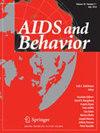The Informal, Non-Prescribed Use of Antiretroviral Medications for PrEP Among a National US-Based Sample of Gay, Bisexual, and Other Men Who Have Sex with Men: A Cross-Sectional Study.
IF 2.7
2区 医学
Q2 PUBLIC, ENVIRONMENTAL & OCCUPATIONAL HEALTH
引用次数: 0
Abstract
This brief report presents findings on informal, non-prescribed PrEP use among an online sample of gay, bisexual and other men who have sex with men (n = 196). Mean age was 33.4. Participants were Hispanic (13.3%), African American (15.8%), white (63.8%), and other race/ethnicity (6.6%). Informal PrEP users (11%) more frequently reported past year sexually transmitted infections (p < 0.001), group sex (p < 0.001), sex in public (p < 0.01), transactional sex (p < 0.001), ever receiving a formal PrEP prescription (p < 0.05), and ease of finding diverted HIV medications on gay dating/sex apps (p < 0.05). Formal PrEP uptake should be encouraged to mitigate potential negative consequences of informal use.
在美国全国同性恋、双性恋和其他男男性行为者样本中,非正式、非处方地使用抗逆转录病毒药物进行PrEP:一项横断面研究。
这份简短的报告介绍了在线样本中同性恋、双性恋和其他男男性行为者(n = 196)非正式、非处方PrEP使用情况的调查结果。平均年龄33.4岁。参与者包括西班牙裔(13.3%)、非裔美国人(15.8%)、白人(63.8%)和其他种族/民族(6.6%)。非正式的PrEP使用者(11%)在过去一年中更频繁地报告性传播感染
本文章由计算机程序翻译,如有差异,请以英文原文为准。
求助全文
约1分钟内获得全文
求助全文
来源期刊

AIDS and Behavior
Multiple-
CiteScore
6.60
自引率
13.60%
发文量
382
期刊介绍:
AIDS and Behavior provides an international venue for the scientific exchange of research and scholarly work on the contributing factors, prevention, consequences, social impact, and response to HIV/AIDS. This bimonthly journal publishes original peer-reviewed papers that address all areas of AIDS behavioral research including: individual, contextual, social, economic and geographic factors that facilitate HIV transmission; interventions aimed to reduce HIV transmission risks at all levels and in all contexts; mental health aspects of HIV/AIDS; medical and behavioral consequences of HIV infection - including health-related quality of life, coping, treatment and treatment adherence; and the impact of HIV infection on adults children, families, communities and societies. The journal publishes original research articles, brief research reports, and critical literature reviews. provides an international venue for the scientific exchange of research and scholarly work on the contributing factors, prevention, consequences, social impact, and response to HIV/AIDS. This bimonthly journal publishes original peer-reviewed papers that address all areas of AIDS behavioral research including: individual, contextual, social, economic and geographic factors that facilitate HIV transmission; interventions aimed to reduce HIV transmission risks at all levels and in all contexts; mental health aspects of HIV/AIDS; medical and behavioral consequences of HIV infection - including health-related quality of life, coping, treatment and treatment adherence; and the impact of HIV infection on adults children, families, communities and societies. The journal publishes original research articles, brief research reports, and critical literature reviews.5 Year Impact Factor: 2.965 (2008) Section ''SOCIAL SCIENCES, BIOMEDICAL'': Rank 5 of 29 Section ''PUBLIC, ENVIRONMENTAL & OCCUPATIONAL HEALTH'': Rank 9 of 76
 求助内容:
求助内容: 应助结果提醒方式:
应助结果提醒方式:


